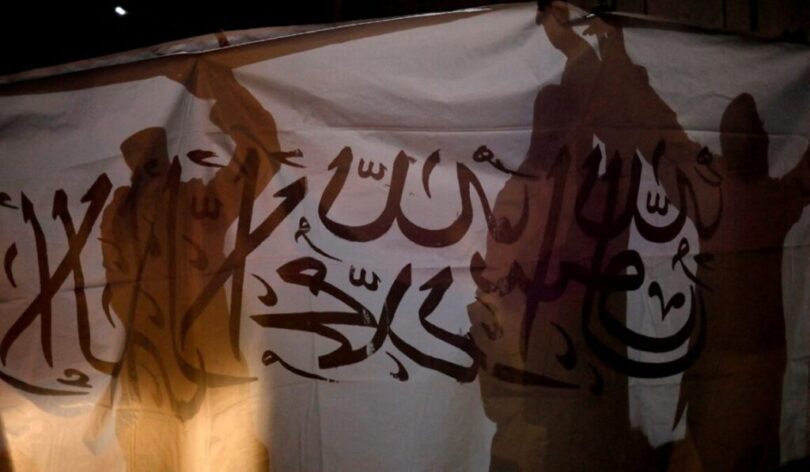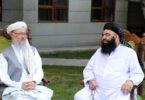KABUL (Amu TV): A recent report by the United Nations Assistance Mission in Afghanistan (UNAMA) to the U.N. Security Council indicates ongoing divergent views within the Taliban’s leadership on governance issues. “The de facto authorities maintained public unity and exerted authority over the entire national territory, although some internal tensions persisted within their structure,” the report states.
The report also notes that the Taliban continued outreach efforts to communities to bridge gaps and elicit support, while reducing space for civil and political activities for both men and women. “They continued their outreach with communities to bridge gaps and to elicit their support, while reducing the space for men and women to conduct civil and political activities,” the report added.
The report highlights that the new school year, which started in March, saw schools remain closed for girls beyond the sixth grade for the third consecutive year. “The new school year started in March, and schools remained closed for girls beyond the sixth grade for a third year in a row,” the report states. Meanwhile, the Taliban has encouraged the enrollment of children in madrassas (Islamic religious schools) and continued to strengthen bilateral diplomatic engagements, particularly with regional countries. “The de facto authorities encouraged people to send children to madrassas and continued to bolster their bilateral diplomatic engagements,” according to the report.
According to the report, an estimated 23.7 million people in Afghanistan will require humanitarian assistance in 2024. “In 2024, an estimated 23.7 million people will require humanitarian assistance,” the report states. As of May 15, the Afghanistan Humanitarian Needs and Response Plan for 2024 had received only 16.2 percent of the required $3.06 billion in funding, targeting 17.3 million people.
Political rifts
The report underscores divergent views within the Taliban’s leadership on governance issues, such as the enforcement of the drug ban. “There were some divergent views within the structure of the Taliban authorities over governance issues, such as the enforcement of the drug ban,” the report said. With fewer cabinet meetings occurring, governance appears to be shifting more towards Kandahar, with Taliban leader Haibatullah Akhundzada exerting greater influence over processes in Kabul. “The center of governance appeared to continue to shift more towards Kandahar, with the Taliban leader exerting greater leverage over governance processes in Kabul,” the report noted.
The Taliban leadership focused on outreach to bridge gaps with various communities, often delivering speeches at madrassa graduation ceremonies that emphasized national unity and the promotion of both religious and modern education. “The leadership of the de facto authorities remained focused on outreach to bridge gaps between the authorities and various communities and elicit their support,” the report added. However, the space for civil society and political activism has been further restricted. “The space for civil society and political activism had been further circumscribed,” the report states.
Human Rights
The rights and fundamental freedoms of women and girls, including access to education and freedom of movement, remained severely curtailed, according to the report. “The rights and fundamental freedoms of women and girls, including access to education and freedom of movement, remained severely curtailed,” the report states. On March 20, the new school year in Afghanistan commenced with the ban on girls’ education beyond grade six still in place. An invitation issued to media by the de facto Ministry of Education specifically instructed women journalists not to attend the ceremony marking the new school year, citing a “lack of proper place[s]” for women.
During the reporting period, residents in multiple provinces held public protests, expressing concerns over economic and livelihood issues ranging from taxes to water rights. “Residents in multiple provinces held public protests, expressing concerns over economic and livelihood issues,” the report notes. While most protests ended peacefully, some were dispersed by force. On March 31, in Helmand Province, shopkeepers protested against a tax imposed by the de facto mayor and demanded the release of two shopkeepers detained earlier for refusing to pay the tax. De facto security forces fired gunshots into the air to disperse the protesters, followed by a physical fight in which they ill-treated at least five male protesters with sticks and rocks. “De facto security forces fired gunshots into the air to disperse the protesters,” the report states.
On May 3 and 4, protests were held in the Argo and Daraiem districts of Badakhshan Province over the de facto authorities’ destruction of poppy fields. “Protests were held in Badakhshan Province over the de facto authorities’ destruction of poppy fields,” the report indicates. Two people were killed—one in each district—when de facto security force members fired into the crowd. “Two people were killed when de facto security force members fired into the crowd,” the report confirms. On May 4, the de facto authorities announced the appointment of a committee to investigate the incidents.
Education and civil society
The Taliban continued to bolster madrassa education, according to the report. “The de facto authorities continued to bolster madrassa education,” it states. Following a countrywide assessment of madrassas in December 2023, the Ministry of Education established a directorate for the professional development of madrassas to improve administration and teacher capacity. Efforts to standardize private madrassa education included conducting exams for 64,000 recent male graduates to determine their qualifications in religious studies. “Following a countrywide assessment of madrassas, steps were taken to standardize private madrassa education,” the report noted.
Security
Between 1 February and 13 May, “the United Nations recorded 2,505 security-related incidents,” a 55 percent increase compared with the same period in 2023, according to the UN report.
The report also noted that “narcotics-related incidents rose from 212 to 418,” marking a 97 percent increase. The largest increases in narcotics-related incidents were observed “in the central, north-eastern, south-eastern, and southern regions,” the report added.
The report indicates that the armed opposition did not pose a significant challenge to the Taliban’s territorial control. “The armed opposition did not pose a significant challenge to the Taliban’s hold on territorial control,” the report states. The Afghanistan Freedom Front and the National Resistance Front conducted attacks primarily targeting de facto security forces in Kabul. ISIL-K conducted six attacks during the reporting period, targeting Taliban authorities on four occasions and civilians on two. “ISIL-K continued to carry out attacks, targeting the de facto authorities and civilians,” the report adds.
Tensions along the border with Pakistan continued due to the reported presence of Tehrik-e Taliban Pakistan (TTP) members on Afghan territory. “Tensions along the border with Pakistan continued owing to the reported presence of TTP members on Afghan territory,” the report states. On March 18, Pakistan carried out airstrikes against locations in Khost and Paktika provinces.
Civilian casualties
Attacks using improvised explosive devices caused at least 98 civilian casualties, including 30 killed and 68 wounded. “Attacks using improvised explosive devices caused at least 98 civilian casualties,” the report states. Unexploded ordnance also resulted in significant civilian casualties, particularly among children. “Unexploded ordnance continued to result in civilian casualties, with children making up the majority,” the report noted. The report documented at least three extrajudicial killings, 37 arbitrary arrests and detentions, and four instances of torture and ill-treatment of former government officials and Afghan National Defence and Security Forces members. “Threats to former government officials continued, including arbitrary arrest and detention, torture, and extrajudicial killings,” the report states.
Economy
Afghanistan’s economy faces deflationary pressure due to declining import prices and low demand, according to the report. “Afghanistan’s economy faces deflationary pressure driven by declining import prices and low demand,” it states. By February 2024, headline inflation reached -9.7 percent year-on-year, and core inflation reached -3 percent. “Headline inflation reached -9.7 percent year-on-year,” the report noted. The trade deficit increased by 60 percent year-on-year from January 2023 to January 2024, with exports decreasing by 5 percent and imports rising by 37 percent. “The trade deficit increased by 60 percent year-on-year,” the report stated. By late March 2024, the Afghani appreciated by 20.4 percent against the U.S. dollar since August 2021.
The present report is submitted pursuant to General Assembly resolution 68/11 and Security Council resolution 2727 (2024), requesting quarterly updates on the situation in Afghanistan and the implementation of the UNAMA mandate.







